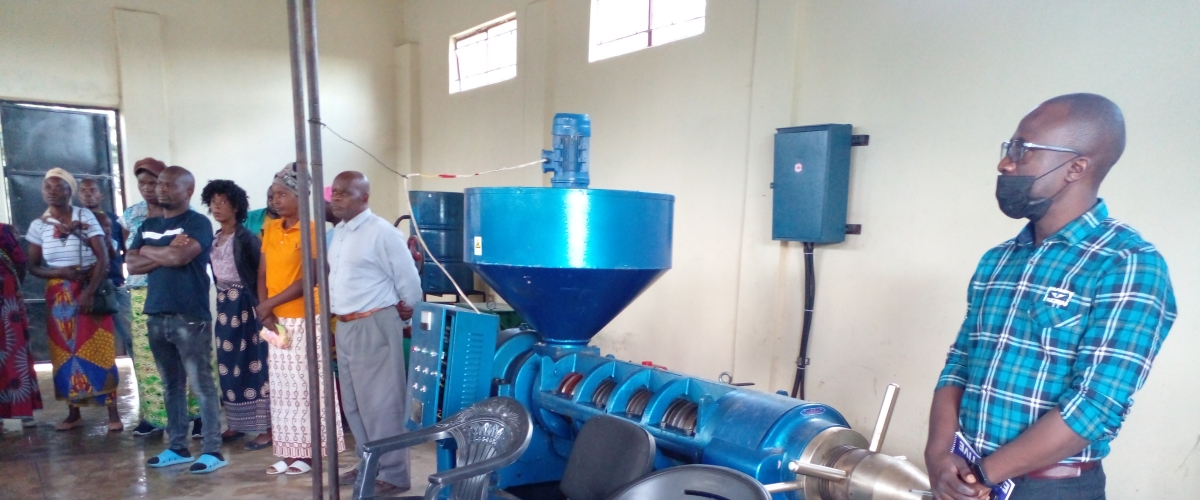
By Happy Mulolani
The lack of an organised market and processing plant for farmers’ soya beans led to low production in previous years in Zambia. But, the recently released crop forecast survey for the 2021/2022 agricultural season and the food security status for 2022/2023 shows a 15 per cent annual rise in the soya bean, of which smallholder farmers produce 96 per cent. This development indicates that soya bean processing equipment is critical to enhancing the production capacity of smallholder farmers.
VAPS Limited, a Small and Medium Enterprise (SME) located in Malaya village in the Mukonchi area in Kapiri Mposhi district, Central province, is engaged in providing a niche market for soya beans. It explored the avenue of processing that has been lacking for some time among most smallholders.
VAPS envisioned setting up a soya bean processing plant but needed support to achieve this milestone. VAPS Limited Director Preston Nkhoma explained that it was at this point that he opted to apply for a matching grant from the Enhanced Smallholder Agribusiness Promotion Programme (E-SAPP). The International Fund for Agricultural Development (IFAD) and the Government of Zambia support the programme. The primary purpose of the financial support is to assist the SME in boosting production capacity and volumes of soya beans to meet the ever-increasing demand of farmers engaged in the soya bean value chain in terms of an organised and reliable market as value addition.
“I made a contribution of K900,000 towards the K2, 800,000 matching grant towards scaling up soya bean production,” Mr Nkhoma disclosed. Since its inception, VAPS was clear about its vision in the soya bean value chain but lacked the financial muscle to scale up its interventions.
Currently, Mr Nkhoma is targeting to work with 350 farmers. So far, VAPS has trained 140 farmers on improved agronomic practices and empowered them with other necessary skills. It has also signed contracts with farmers and provides soft loans, including soya bean seed, herbicides and fertiliser. “I’m also buying soya bean from farmers at an attractive price of K8.50 per kilogramme of soya bean, most of which I am processing into cooking oil,” Mr Nkhoma said.
VAPS also purchased a tractor from the grant to enable smallholder farmers to increase their hectarage area. Tractor usage translates to higher volumes of production for farmers as compared to the use of a hoe. “VAPS now offer tractor services to farmers at a subsidised rate of K400 per hectare,” Mr Nkhoma said.
Speaking during a mid-term review field visit to VAPS in Kapiri Mposhi, IFAD Country Programme Officer Brian Kapotwe explained that the programme has a strong component of agribusiness to support smallholder farmers beyond small-scale farming and commercialise their value chain through matching grants.
“To catalyse that, E-SAPP has been giving out Matching grants until 2021, and substantial amounts have been disbursed. For this particular enterprise, close to K3,000,000 has been invested in the soya bean plant and storage facility,” Dr Kapotwe said.
Over 400 soya bean farmers in Kapiri Mposhi district are expected to benefit directly or indirectly from the processing plant.
Enhanced Smallholder Agribusiness Promotion Programme, Programme Coordinator Emmanuel Mulenga said that each farmer is expected to produce at least 3.5 tonnes which should be able to feed into this processing equipment.
“What is key is that farmers have realised that soya bean is an attractive crop which they can benefit from,” Mr Mulenga said.
The interventions offered need to be appreciated as farmers have gained knowledge on improved agronomic practices and linkage to organised markets.
These good practices support the recently released crop forecast survey, which states, “soya bean production is expected to increase to 475,353 tonnes from last year’s 411,115 tonnes.”
This translates to increased production of 15.63, as recorded in the 2020/2021 farming season. This shift is attributed to the lucrative market prices, which are as high as K10 from a paltry K4.50 per kilogramme floor price set by the Food Reserve Agency (FRA). The status quo witnessed an increase of hectarage area of 29.6 per cent the previous farming season.
With this initiative, smallholder farmers need to take advantage of this opportunity to increase their soya bean production from one hectare to five hectares. This will enable the farmers to feed into the already operational processing plant, an available strategic market.
With this proper support for the soya bean value chain, smallholder farmers are expected to graduate from subsistence farming and commercialise their activity through increased production, volumes and sales.
The author is a journalist and works as a Television Producer with the National Agricultural Information Services





